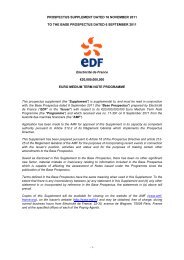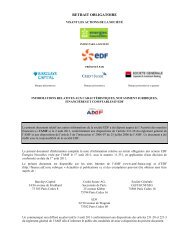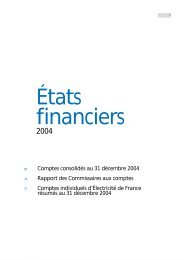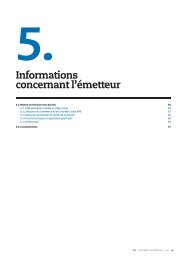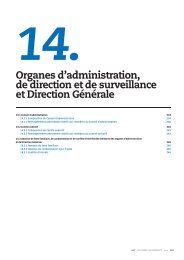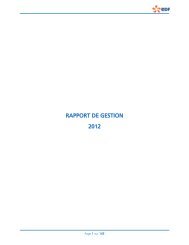Under the Euro Medium Term Note Programme ... - Finance - EDF
Under the Euro Medium Term Note Programme ... - Finance - EDF
Under the Euro Medium Term Note Programme ... - Finance - EDF
You also want an ePaper? Increase the reach of your titles
YUMPU automatically turns print PDFs into web optimized ePapers that Google loves.
Risk Factors<br />
Increased competition and a decrease in <strong>the</strong> principal mineral deposits associated with more<br />
stringent regulatory requirements have slowed <strong>the</strong> rate at which ESCs are produced and<br />
made <strong>the</strong>m more expensive. This trend has been accentuated by <strong>the</strong> economic crisis, which<br />
has reduced households’ investment capacity and hurt <strong>the</strong> construction sector.<br />
Against this background, <strong>the</strong> proposal Energy Efficiency Directive adopted in June 2011 and<br />
<strong>the</strong> French political decisions that may be taken as a result <strong>the</strong>reof if <strong>the</strong> measure is<br />
extended for a third period after 2014 may lead to considerably more stringent obligations.<br />
These provisions could significantly increase <strong>EDF</strong>’s sales costs and require a considerable<br />
increase in regulated sale rates, because such rates are set by <strong>the</strong> public authorities.<br />
Therefore <strong>EDF</strong> cannot guarantee that increased sales costs will be completely reflected in<br />
<strong>the</strong> rates.<br />
The expansion of an integrated <strong>Euro</strong>pean electricity market may be slowed by a lack<br />
of cross-border transmission system interconnections<br />
The development of an integrated <strong>Euro</strong>pean electricity market is inhibited by a lack of crossborder<br />
interconnections. This situation limits exchange capacity between operators in<br />
different countries, in particular <strong>the</strong> capacity to rapidly adapt supply to demand (“blackout<br />
risk”), and allows price differences in different countries to persist, which would be<br />
significantly reduced in an efficient integrated <strong>Euro</strong>pean market. It also impedes <strong>the</strong><br />
emergence of efficient operators with a <strong>Euro</strong>pean scope as it limits <strong>the</strong> possibilities for<br />
synergies between companies within a same group located on different sides of a border.<br />
Although <strong>the</strong>re are currently several projects to develop interconnections (investments are<br />
determined by transmission network managers independently from producers), <strong>the</strong>ir<br />
construction has none<strong>the</strong>less been slowed down, mainly by environmental, regulatory and<br />
local acceptability considerations.<br />
Fur<strong>the</strong>rmore, <strong>the</strong> lack of adequate interconnections between countries where <strong>the</strong> <strong>EDF</strong> Group<br />
is based or <strong>the</strong> failure to develop such interconnections at an adequate pace may limit <strong>the</strong><br />
industrial synergies that <strong>the</strong> <strong>EDF</strong> Group strives to achieve between its various entities or may<br />
cause network interruptions in countries in which <strong>the</strong> <strong>EDF</strong> Group is established, which could<br />
have a negative impact on its results, business and outlook.<br />
Repeated or widespread blackouts in France or in an area served by a subsidiary of<br />
<strong>EDF</strong>, particularly if <strong>the</strong>y are attributable to <strong>the</strong> Group, may have consequences for <strong>the</strong><br />
Group’s activities, results and image<br />
The <strong>EDF</strong> Group may be <strong>the</strong> source of repeated or widespread blackouts or be blamed for<br />
one, even if <strong>the</strong> causal event occurred in ano<strong>the</strong>r network or was attributable to ano<strong>the</strong>r<br />
operator.<br />
The causes of blackouts vary: local or regional imbalances between electricity generation<br />
and consumption, accidental interruptions to <strong>the</strong> power supply, cascading power failures<br />
(more difficult to stop in a market with cross-border exchanges), interconnection problems at<br />
borders and difficulty in coordinating operators in a liberalised market.<br />
The initial impact of such power failures would be repair costs incurred to re-establish power<br />
or restore <strong>the</strong> network. Power failures may also generate capital expenditures if it were<br />
decided, for example, to install additional generation or network capacity. This could also<br />
-45 -



